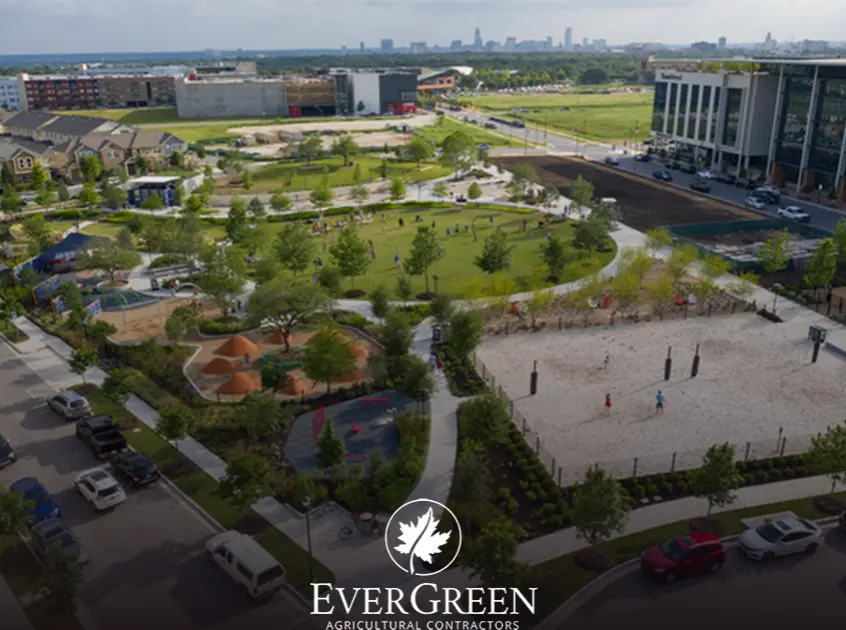


Public park design landscape architecture

A well-planned Public park design landscape architecture transforms open spaces into beautiful, functional, and sustainable environments for communities. Parks are more than just green areas; they provide relaxation and social interaction.
At Evergreen, we have expertise in public park design ideas and execution. Our expert team creates customized landscapes that meet the needs of both people and nature, ensuring the long-lasting beauty and function of the park.
Public park design Concept
Public Park Design Concept focuses on creating inclusive, sustainable, and functional outdoor spaces that serve diverse community needs, The design aims to balance natural beauty with recreational facilities, ensuring accessibility for all age groups and abilities.
Key elements include open green areas, walking paths, playgrounds, seating zones, and water features, all integrated thoughtfully to encourage social interaction, physical activity, and environmental stewardship. Effective park design also considers safety, maintenance, and ecological impact, making the space welcoming, enjoyable, and resilient for years to come.
Park design Plan
A Park Design Plan is a detailed blueprint that outlines the layout, features, and functional elements of a public or private park, It includes zoning for various activities such as playgrounds, picnic areas, walking trails, sports facilities, and natural habitats.
The plan focuses on creating an inviting and accessible environment that promotes recreation, relaxation, and community engagement, It also addresses landscaping, lighting, drainage, and sustainability practices to ensure the park remains safe, attractive, and environmentally friendly over time. A well-crafted park design plan balances aesthetics with practicality to meet the diverse needs of its users.
Small park landscape design
Small Park Landscape Design focuses on maximizing limited space to create a functional and inviting green area that meets community needs, It emphasizes efficient use of land through smart zoning, incorporating multi-purpose features like seating, playgrounds, and walking paths without overcrowding, Plant selection prioritizes low-maintenance, native species that enhance biodiversity and seasonal interest. Thoughtful design ensures accessibility, safety, and aesthetic appeal, transforming small urban or neighborhood parks into cherished local retreats that promote social interaction and relaxation.
Park Landscape design ideas
Park landscape design ideas focus on creating inviting and functional outdoor spaces that blend natural elements with recreational features. Incorporating walking trails, native plants, shaded seating areas, and play zones enhances visitor experience while promoting biodiversity. Simple water features and open lawns add beauty and relaxation spots, making parks enjoyable for all ages.
Learn more about
Park Attributes & Recommendations
These attributes are essential for designing parks that meet the needs of the community and align with the design principles. The key attributes and recommendations are:
-
Spatial Organization
Refers to the relationship between activities and future expansion opportunities in parks. Recommendations include grouping activities to maximize desirable effects, ensuring security and safety.
-
Recreational Facilities
Parks should have both active and passive recreational areas. Active areas include playgrounds and sports facilities, while passive areas include picnic spots and nature trails.
-
External Linkages
Parks should be connected to nearby green spaces, waterways, and social networks. Recommendations include creating habitat connectivity.
-
Internal Circulation
A well-connected network of park roads and paths should accommodate all forms of travel. Recommendations include creating a hierarchy of pathways, using natural materials for paving, and providing adequate access for maintenance vehicles.
-
Shading & Shade Structures
Shade structures should provide relief from natural and artificial elements. Recommendations include providing continuous shade for walkways, shaded rest areas, and pergolas designed for sitting and viewing.
-
Softscape & Planting Design
Softscape elements should soften hard lines in the landscape and provide privacy. Recommendations include using non-invasive plants, creating microclimates, and designing water-efficient landscapes.
-
Hardscape
Hardscape materials should be durable and sustainable. Recommendations include using permeable paving, local resources, and recycled materials to reduce environmental impact.
-
Furniture & Outdoor Equipment
Park furniture should be accessible and durable. Recommendations include providing a variety of seating options and secure bicycle racks.
-
Special Features
Water features and public art can enhance the park experience. Recommendations include locating water features in high-activity areas and integrating public art within water features.
-
Lighting
Proper lighting is essential for safety and visual interest. Recommendations include using solar lighting, providing exterior security lighting, and minimizing light pollution.
-
Fences, Walls & Screens
These should be used to define utility areas and restrict public access where necessary. Recommendations include minimizing perimeter fencing and using walls to a maximum height of 0.5 meters.
-
Water Management
Parks should manage water efficiently to improve the quality and reduce the quantity of stormwater runoff. Recommendations include using rainwater harvesting, designing low-impact irrigation systems, and creating absorbent landscapes.
These principles and attributes provide a comprehensive guide for designing, developing, and maintaining public parks, ensuring they are safe, accessible, sustainable, and enjoyable for all users.
Learn more about
Simple landscape design for front of house
Why Choose Evergreen for Public park design landscape architecture?
With years of experience in public park landscape design and architecture, Evergreen Agricultural Contracting Company transforms open spaces into dynamic community hubs. Our expertise covers every aspect of park development, from concept to completion, ensuring seamless execution at every stage.
- Comprehensive services, including design, construction, irrigation, lighting, and ongoing maintenance.
- Innovative and sustainable solutions tailored to meet the unique needs of each project.
- A commitment to creating functional, eco-friendly, and visually stunning parks that serve communities for generations.
If you’re looking for expert public park landscape design and architecture, partner with Evergreen Agricultural Contracting Company to bring your vision to life. Whether you’re planning a new park or upgrading an existing one, our team ensures a professional, high-quality, and sustainable approach. Contact us today to discuss your project.
What considerations go into designing pathways in a public park?
Pathways should be wide enough for pedestrians and cyclists, smoothly paved, well-lit, and strategically placed to connect different areas efficiently.
How do water features enhance public park design?
Elements like fountains, ponds, and waterfalls create focal points, enhance aesthetics, and promote a calming environment while supporting ecological balance.
